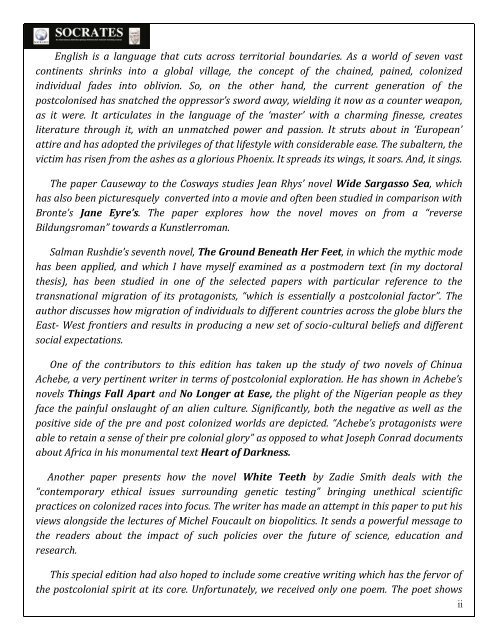SOCRATES special issue VOL. 6 NO.1 2018-Preview
Create successful ePaper yourself
Turn your PDF publications into a flip-book with our unique Google optimized e-Paper software.
English is a language that cuts across territorial boundaries. As a world of seven vast<br />
continents shrinks into a global village, the concept of the chained, pained, colonized<br />
individual fades into oblivion. So, on the other hand, the current generation of the<br />
postcolonised has snatched the oppressor’s sword away, wielding it now as a counter weapon,<br />
as it were. It articulates in the language of the ‘master’ with a charming finesse, creates<br />
literature through it, with an unmatched power and passion. It struts about in ‘European’<br />
attire and has adopted the privileges of that lifestyle with considerable ease. The subaltern, the<br />
victim has risen from the ashes as a glorious Phoenix. It spreads its wings, it soars. And, it sings.<br />
The paper Causeway to the Cosways studies Jean Rhys’ novel Wide Sargasso Sea, which<br />
has also been picturesquely converted into a movie and often been studied in comparison with<br />
Bronte’s Jane Eyre’s. The paper explores how the novel moves on from a “reverse<br />
Bildungsroman” towards a Kunstlerroman.<br />
Salman Rushdie’s seventh novel, The Ground Beneath Her Feet, in which the mythic mode<br />
has been applied, and which I have myself examined as a postmodern text (in my doctoral<br />
thesis), has been studied in one of the selected papers with particular reference to the<br />
transnational migration of its protagonists, “which is essentially a postcolonial factor”. The<br />
author discusses how migration of individuals to different countries across the globe blurs the<br />
East- West frontiers and results in producing a new set of socio-cultural beliefs and different<br />
social expectations.<br />
One of the contributors to this edition has taken up the study of two novels of Chinua<br />
Achebe, a very pertinent writer in terms of postcolonial exploration. He has shown in Achebe’s<br />
novels Things Fall Apart and No Longer at Ease, the plight of the Nigerian people as they<br />
face the painful onslaught of an alien culture. Significantly, both the negative as well as the<br />
positive side of the pre and post colonized worlds are depicted. “Achebe’s protagonists were<br />
able to retain a sense of their pre colonial glory” as opposed to what Joseph Conrad documents<br />
about Africa in his monumental text Heart of Darkness.<br />
Another paper presents how the novel White Teeth by Zadie Smith deals with the<br />
“contemporary ethical <strong>issue</strong>s surrounding genetic testing” bringing unethical scientific<br />
practices on colonized races into focus. The writer has made an attempt in this paper to put his<br />
views alongside the lectures of Michel Foucault on biopolitics. It sends a powerful message to<br />
the readers about the impact of such policies over the future of science, education and<br />
research.<br />
This <strong>special</strong> edition had also hoped to include some creative writing which has the fervor of<br />
the postcolonial spirit at its core. Unfortunately, we received only one poem. The poet shows<br />
ii


